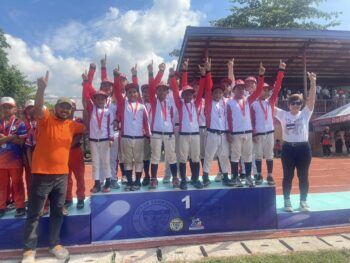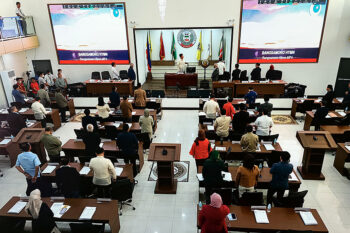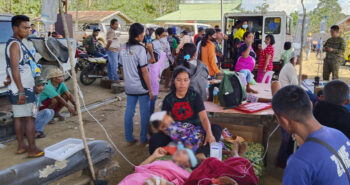GENERAL SANTOS CITY (MindaNews/ 19 April) — Passing a Bangsamoro Basic Law (BBL) that embodies Draft BBL virtually intact is not enough to have a BBL meaningful for the establishment of Bangsamoro. The other no-option element is proper transition. This will require the amendment of Article XVI of the Draft on “Bangsamoro Transition Authority” to provide a fixed transition period long enough for the BTA to accomplish the tasks it is mandated to do.
How long must this fixed period be? The answer is in Article XVI. The tasks are stated; the nature of each task and prevailing circumstances will determine the time it will take to accomplish it – not a matter of wild guessing or wishing but of serious assessment of facts and rationalization.
The “transition period” is “for the establishment of the Bangsamoro” which “shall commence upon the ratification of this Basic Law” and “shall end upon the dissolution of the Bangsamoro Transition Authority, as provided in this Basic Law” [Article XVI, Section 1]. In point of time, the period has no fixed commencement – just dependent on the hard-to-predict time of “ratification”.
When is the BTA to be dissolved? This, too, has no fixed time: “Immediately upon the qualification of the elected Chief Minister under the first Bangsamoro Parliament, the Bangsamoro Transition Authority shall be deemed dissolved” [Section 11]. While the May 2016 election is fixed, the qualification of the elected Chief Minister can be delayed by election protests.
At present, we are only certain, if Article XVI is not amended, that (1) the Chief Minister will be elected on the second Monday of May, 2016; (2) after that Bangsamoro, deemed established by the BTA, will be inaugurated any time before June 30, 2016.
Scenarios
What can happen? The following are defining facts for different scenarios. June 11 is the new deadline set by the Congress to pass the BBL. By constitutional fiat, a law to be ratified can be submitted to a plebiscite not earlier than 90 or later than 120 days after it has been signed by the President. In the case of the BBL, the Commission on Elections has said the plebiscite must be before October so as not to conflict with its preparations for the May 2016 elections. That the BBL will go to the Supreme Court is a given.
Scenario 1: The BBL is passed and signed by the President by June 15 and ratified by September 15. The transition period will be eight months.
Scenario 2: The BBL is passed and signed by the President by June 15. It is questioned in the Supreme Court. If, like in the case of the Memorandum Agreement on Ancestral Domain it will take the Court two-and-a-half months to render decision, the verdict will be known before September 15. If unfavorable, the BBL is dead; if favorable, the 90-day cut-off for the plebiscite is December 15. By that time the election period has started. Will the Comelec still hold the plebiscite?
Scenario 3: The BBL is not passed and signed by June 15 but in August. If it is not taken to the Court, it will be eligible for the plebiscite in December; as in Scenario 2, will the Comelec entertain a plebiscite? If questioned and gets the favorable verdict, the plebiscite cannot be held until after June 15, 2016? Will the Comelec entertain that?
Scenario 4: Passing and signing the BBL in December is the last straw under the Aquino III administration if not questioned in Court. The plebiscite is held simultaneously with the May 2016 election. The BTA is constituted by the end of May. There are no elected regular members of the Parliament. Bangsamoro is not inaugurated.
Scenario 1 is just a manageable, not the best but poor case, scenario. Scenario 4 is the worst case, if the BBL is not questioned in Court. But, just like Scenarios 2 and 3, the BBL is dead if questioned in Court. Even if not questioned, the BBL in Scenarios 2 and 3 is as good as dead unless the Comelec finds time for the plebiscite.
Scenario 1
By Scenario 1, what can the BTA do within the transition period of eight months?
The primary mandate of the BTA is “the establishment of the Bangsamoro”. It is a transitional – not a care-taker or OIC – government. It will transform the system of government of the Autonomous Region in Muslim Mindanao into that suitable to the parliamentary-ministerial government of Bangsamoro. Besides human and financial resources, this will entail much time.
The following are priority functions the BTA must accomplish:
Setting up the government: Prospective candidates are vetted for the selection of fifty BTA members. Once appointed, the fifty will organize the Parliament and elect the Interim Chief Minister (ICM) for appointment by the President. The ICM will form his cabinet of ten ministers. Can this be done in the first month?
Organization of the bureaucracy: To organize the bureaucracy, the BTA will set up offices and necessary institutions; institute “a placement process for hiring personnel”; and approve and implement a transition plan [XVI.4(b).8.9].
Transfer of powers and properties: The BTA shall administer the transfer of powers and properties from the ARMM to Bangsamoro Government and the disposition of personnel [XVI.4(c)]. Judging from what this will entail [XVI.9], it will take some time to accomplish. It will deflect time from regular transition activities.
Enactment of priority legislations: The BTA shall enact [XVI.4(a)] (1) the Bangsamoro Administrative Code, (2) the Bangsamoro Revenue Code] and (3) the Bangsamoro Electoral Code [VII.9]; it may enact a (4) Bangsamoro Civil Service Code [V.2(8)].
If the House Ad Hoc Committee on BBL has deleted the Draft BBL provision creating the “a Bangsamoro Electoral Office” [in VII.9.], the enactment of the Bangsamoro Electoral Code is unnecessary. And so will the enactment of the Bangsamoro Civil Service Code become moot with the AHCBBL having deleted the Draft BBL provision creating “a Bangsamoro Civil Service Office” [V.2(8)].
However, the remaining two will take time to enact.
Just-in-Case Provisions
Evidently, the inadequacies of the BTA had been anticipated. The drafters of the BBL and the revisers of the Draft knew the immensity of the tasks mandated and the limitation of time to accomplish them.
Paragraph 4 of Section 1 of Article XVI reads: “The period of transition herein defined shall be without prejudice to the initiation or continuation of other measures that may be required by post-conflict transition and normalization even beyond the term of the BTA.” (Bold italics ours)
One urgent mandate of the ICM is to “submit to the BTA a transition plan [XVI.5]”. This has to be done within the first sixty days of the transition period, to be approved within ten days after its submission, and to be implemented within fifteen days after its approval. By Paragraph 4, the regular government will continue implementing the transition plan if this is not completely done by the BTA upon its dissolution.
Regarding the “priority legislations” above, the “Provided-clause” of XVI.4(a) says that until the Bangsamoro Administrative Code is enacted the “Muslim Mindanao Autonomy Act No. 25 or the ARMM Local Government Code “shall apply in the Bangsamoro”. It is not provided what must apply until the enactment of the Bangsamoro Revenue Code. Of course, this is normal practice. But should the BTA fail to enact these upon its dissolution, the regular Parliament will continue the work.
These “just-in-case provisions” are unnecessary if there is a fixed transition period long enough for the BTA to accomplish its transition plan and other tasks. These “provisions” are cogent arguments for amending Article XVI to provide this fixed transition period.
Three-Year Transition Period
It is now certain: By Scenario 1, the transition period will be only eight months. With the election period starting in December, the BTA will be seriously distracted. By Scenario 4, the transition period will only be one-and-a-half months. There will be just time for the appointment of the BTA and its organization. The only sensible recourse of the Congress is to amend Article XVI.
We suggest this:
First: Change the title of Article XVI to “Bagsamoro Transition Period”.
Second: Appoint, organize and task the BTA members as already provided in Article XVI.
Third: Set the election of the regular Bangsamoro Parliament in May 2019
Fourth: Inaugurate Bangsamoro before June 30, 2016 with the BTA converted into a transitional government to be renamed BTG or Bangsamoro Transitional Government.
That fixes the transition period to three years with the BTG continuing the transition work started by the BTA. MILF will appreciate this it is the answer its apprehensions about the shortening transition period. A meaningful BBL providing a three-year transition period will ensure the establishment of a stable Bangsamoro. Government is a continuum – the incumbent carrying out the obligations of the past. BTG, led by MILF, will continue working with the next administration to implement the BBL.
The Palace and the GPH peace panel will also appreciate this. Under the present dire circumstances, this is the only way to secure the legacy of President Benigno Simeon C. Aquino III. Bangsamoro so inaugurated will go down in history in his memory.
Question: Can the Congress be convinced to amend Article XVI to fix the Bangsamoro transition period to three years – from June 2016 to May 2019? Who will do the convincing?
But the members of the Senate and the House should need no convincing. Establishing the Bangsamoro and lasting peace and progress, “especially in Muslim Mindanao, is also the legacy of the Sixteenth Congress.
Or, will they like going down in history as the “abortionist of peace and progress”?
(Comment” is Mr. Patricio P. Diaz’ column for MindaViews, the opinion section of MindaNews. The Titus Brandsma Media Awards honored Mr. Diaz with a “Lifetime Achievement Award” for his “commitment to education and public information to Mindanawons as Journalist, Educator and Peace Advocate.” You can reach him at patponcediaz@yahoo.com.)







